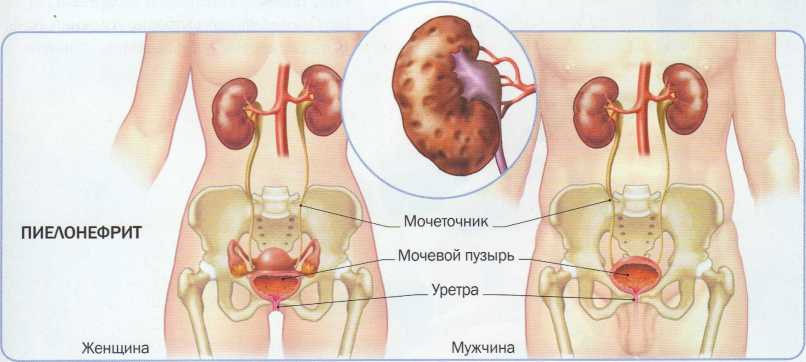Symptoms and stages of chronic renal failure

Chronic renal failure never arises "by itself" - this pathology is a complication of many kidney diseases.But if we talk about the symptoms of chronic kidney failure, then they will be absolutely identical, regardless of what caused the development of pathology.
Table of Contents: Causes of Chronic Renal Failure Renal Failure in the Latent Stage - Symptoms Azotemic Stage of Renal Insufficiency - Signs of the End-Stage Stage of Renal InsufficiencyCauses of Chronic Renal Failure
Recommended:It is believed that the disease under consideration is most oftenArises against the background of inflammatory and / or infectious pathologies of the kidneys.But there are diseases of other organs and systems that can also lead to chronic kidney failure.
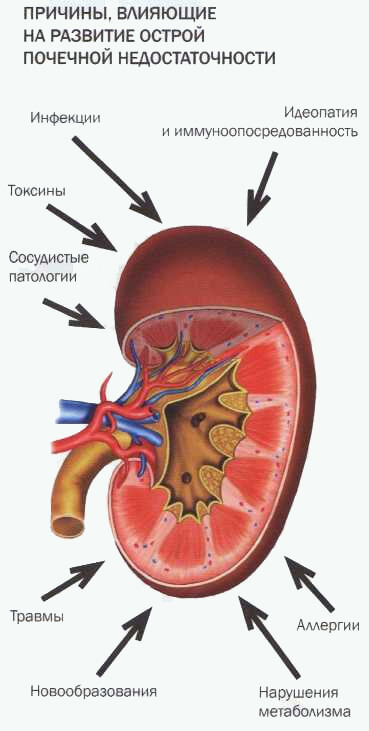 Physicians have identified a list of pathologies that contribute to the development of the disease under consideration:
Physicians have identified a list of pathologies that contribute to the development of the disease under consideration:
- urolithiasis;
- diabetes mellitus;
- gout;
- persistent hypertension - hypertension;
- amyloidosis;
- glomerulonephritis;
- pyelonephritis, flowing in chronic form;
- polycystic kidney disease;
- systemic lupus erythematosus.
It is not necessary that when diagnosing the aforementioned diseases the patient will suffer from chronic renal failure - this pathology is a complication and several factors need to converge to develop it.
Renal failure in the latent stage - symptoms
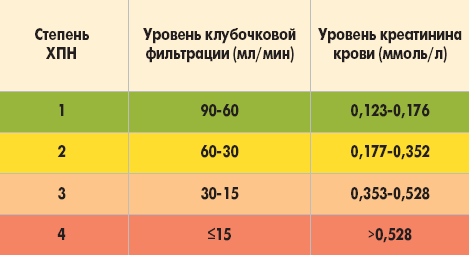
The clinical picture of renal failure in the latent stage of the course will depend on which disease led to the development of pathology.Symptoms can be very different - swelling that occurs during the day and is independent of the amount of fluid used, increased blood pressure for no apparent reason, pain syndrome concentrated in the lumbar region.Often doctors note and complete disregard of the first symptoms of chronic renal failure in the latent stage - this happens with progressive glomerulonephritis and / or polycystic kidney disease.
In the latent stage of the current illness, the patient will complain of increased fatigue, insomnia and loss of appetite, up to a total refusal of food.These complaints are absolutely not specific, therefore the doctor will be able to correctly diagnose and associate such changes in the patient's state of health with kidney functioning problems after a thorough examination of the patient.
The patient himself and his attending physician must be urged to have frequent urination at night, which occurs even with the minimum amount of liquid used in the evening.This condition may indicate that the kidneys can not concentrate urine.
In kidney disease, a part of the glomeruli die, and the remaining ones can not cope with the function of this organ - the liquid is not completely absorbed in the tubules, the density of urine is so reduced that in some cases the parameters approach the parameters of the blood plasma.To clarify this point, doctors prescribe the patient urine samples for Zimnitsky - if in any of the urine a density of 1018 is not present, then we can talk about the progression of kidney failure.Critical is the indicator of the density of urine in 1010 - this means that the reabsorption of the fluid is completely stopped, and the disturbances in the work of the kidneys have gone too far.
The latent stage of the development of chronic renal failure eventually acquires increasingly pronounced symptoms - for example, the patient begins to complain of increased thirst, but there is no increased pressure( unless it was the cause of the complication), a blood test does not show a decrease in hemoglobinAnd electrolyte shifts.If the doctor conducts examination of the patient at this stage of development of the disease in question, a reduced amount of vitamin D and parathyroid hormone will be detected, although there will be no signs of progression of osteoporosis.
Note: at the latent stage of development of chronic renal failure differs reversibility of symptoms - with timely diagnosis and the provision of professional medical care can prevent progression.
Azotemic stage of renal failure - signs
If the latent stage of the development of the disease in question was diagnosed in time, but the treatment does not yield any results, the progression of the pathology will occur at a rapid rate - an irreversible stage of chronic renal failure begins. In this case, the patient will complain of quite specific symptoms:
- Arterial blood pressure rises, there are constant headaches and discomfort in the anatomy of the heart - this is due to a decrease in the synthesis of renin and renal prostaglandins in the kidneys.
- Muscle mass becomes less, the patient sharply grows thin, there is an intestinal disorder, appetite decreases, often nausea - these symptoms are caused by the fact that the function of excretion of slag partially takes on the intestine.
- Erythropoietin in the kidneys starts to be produced in too small amounts, which leads to the development of stable anemia.
- There are complaints about numbness of the upper and lower extremities( feet and hands), corners of the mouth, pronounced muscle weakness - the cause of this condition is the lack of active vitamin D in the body and a decrease in the level of calcium.For the same reason, the patient may start abnormalities in the psychoemotional background - excitement or depression develops.
With the progression of chronic renal failure, a more severe stage 4 disease occurs. It will have the following symptoms:
-
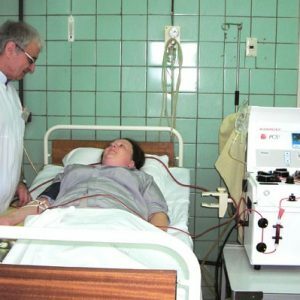 Against the background of high blood pressure there are violations of lipid metabolism, the level of cholesterol and triglycerides sharply increases.This combination of disturbances leads to vascular and brain accidents.
Against the background of high blood pressure there are violations of lipid metabolism, the level of cholesterol and triglycerides sharply increases.This combination of disturbances leads to vascular and brain accidents. - The level of phosphorus in the blood rises, calcifications appear - this leads to the development of osteoporosis, phosphoric and calcium salts appear in the tissues.The patient is constantly disturbed by sharp, intense pains in the joints.
- Kidneys provide removal of harmful purine compounds from the body, but in the severe 4 stage of chronic renal failure this function is completely lost.The result is the progression of secondary gout and typical acute painful attacks in the joints.
- Heart rhythm disturbances( extrasystole, atrial fibrillation) appear, and the reason for this is an increase in the level of potassium in the body.The more potassium accumulates in the body, the more violent the cardiac rhythm will be, and the electrocardiogram can reveal characteristic infarct changes.
- The patient's face becomes puffy, his salivary glands are enlarged, a characteristic acetone smell comes from the company, and the mouth has an extremely unpleasant taste - it all happens under the influence of uremic toxins.
Manifestations of the terminal stage of renal failure
At this stage of development of the examined disease, the patient receives only substitution treatment - he is regularly given hemodialysis and / or peritoneal dialysis.
The main signs of the course of chronic renal failure at the terminal stage are the following manifestations:
- Kidneys stop producing urine, or produce it in catastrophically small amounts.Diuresis passes into anuria, peripheral and central edemas abruptly appear and progress, but pulmonary edema is considered especially dangerous.
- Appears intense itchy skin, the covers are clearly visible traces of scratching, and the skin color changes to grayish-yellow.
-
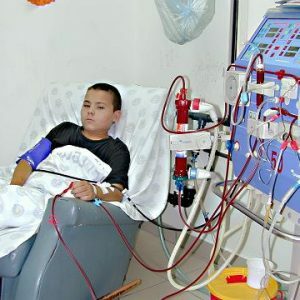 From the nose often comes blood, bleeding gums, bruises and bruises on the skin even with a slight mechanical effect - this tendency to bleed is provoked by uremic toxins accumulated in the body in large quantities.Against this background, gastric and / or intestinal bleeding may develop, and this, in turn, aggravates anemia.
From the nose often comes blood, bleeding gums, bruises and bruises on the skin even with a slight mechanical effect - this tendency to bleed is provoked by uremic toxins accumulated in the body in large quantities.Against this background, gastric and / or intestinal bleeding may develop, and this, in turn, aggravates anemia. - There are electrolyte shifts, which leads to mental and neurological changes - paralysis, severe depression and manic conditions may develop.
- Elevated blood pressure can not be stabilized even by powerful drugs, signs of congestive heart failure appear, in some cases uremic pericarditis is diagnosed.
- Acidosis, respiratory disorders, congestion in the lungs lead to pneumonia.
- Develops uremic gastroenterocolitis - the patient has a loose stool, nausea and vomiting.
Note: life of patients with chronic kidney failure at the 4 stages of development is calculated even for days - hours!Therefore, it is highly desirable to seek professional medical care much earlier, when the first symptoms of the disease appear.
Specific symptoms of chronic renal failure develop at later stages of the pathology, when already irreversible processes occur in the kidneys.And to identify the development of the disease in the 1-2 stages, you need to regularly give blood and urine tests - especially for those patients who are at risk.
Tsygankova Yana Aleksandrovna, medical reviewer, therapist of the highest qualification category

